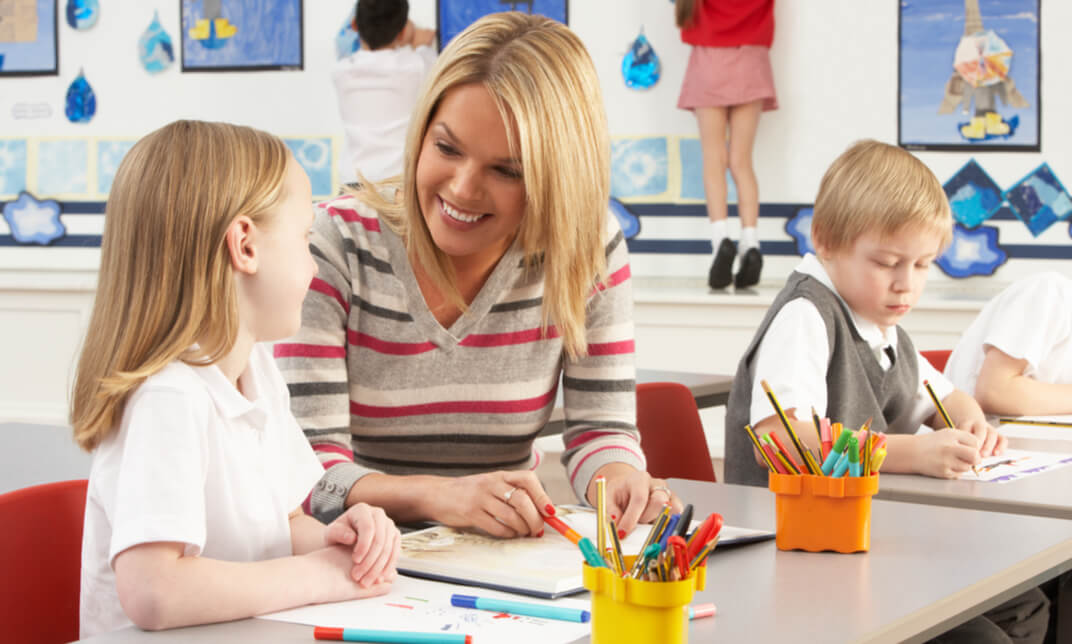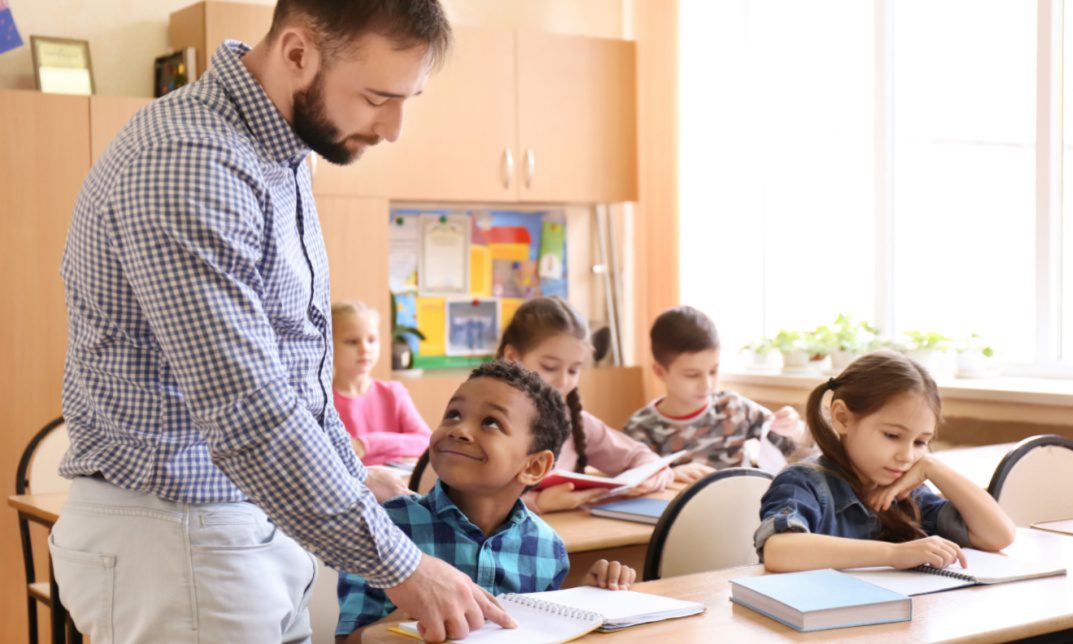No products in the basket.
Introduction
Children in kindergarten through sixth grade get primary teaching, often known as elementary education. Students receive a fundamental grasp of numerous disciplines as well as the abilities they will need throughout their lives via primary education.
Primary teaching, often known as elementary education, is the first stage of formal education, following preschool/kindergarten and preceding high school. Depending on where you live, primary teaching is provided in primary schools, elementary schools, or first and middle schools. Hence, to ensure children’s growth to maximise their social, cognitive, cultural, emotional, and physical potential. Primary teaching raises children’s awareness, expands their prospects, and minimises intergenerational poverty.
The school offers early socialization, teaching kids to interact with classmates apart from family. A safe atmosphere fosters security and trust, leading to self-assurance. Elementary education encourages development and autonomy, providing a great benefit to a child’s growth.
Who Is A Primary School Teacher?
Primary school teachers are in charge of the educational, social, and emotional development of students aged 5 to 11.
What Is The Role Of A Primary Teacher?
Primary school instructors create lesson plans and schemes of work based on curricular goals. They support learning by building relationships with students, organising their learning tools, and fostering a good learning atmosphere in the classroom. Primary school instructors are responsible for the social, emotional, intellectual, physical, and moral growth of their students. They make certain that pupils have adequate numeracy and reading skills before entering high school.
Their purpose is to create and cultivate the proper skills and social abilities for children’s optimal development based on age, ability, and aptitude. They will examine and record students’ progress and prepare them for national assessments. They will connect students’ knowledge to previous learning and devise strategies to promote it further, challenging and motivating students to help them expand their knowledge and comprehension.
Primary school instructors often teach a wide range of courses from the national curriculum, with a focus on the fundamental areas of reading, numeracy, and science. Some specialise in one field, such as maths, languages, or science. Primary teaching is a rewarding vocation with several options for advancement (such as becoming a head of the year) and specialisation (such as taking on the role of special educational needs coordinator).
Primary teaching is not always an easy profession; hours might be long because there’s generally prep work to perform before and after school throughout the school year. However, you will be given time during the day to plan, and you may be assisted in the classroom by teaching assistants. You’ll also get access to specialised assistance, including a mentor, during your first two years.
What Skills Do You Need To Become A Primary Teacher?
To become a primary school teacher, you must have:
- Great communication and interpersonal qualities
- Abilities in planning, organisation, and time management
- Imagination, creativity, and a sense of humour
- Skills of Listening, and the capacity to reflect on your teaching practice
- Excellent cooperation abilities and the ability to engage in a variety of initiatives with other employees and education professionals
- The capacity to think on your feet and use your initiative
- Dedication to equal chances
- The capacity to employ a range of tactics and practises to promote varied cultures and equity concerns in the classroom
- A commitment to the safety and welfare of all pupils
- Patience and devotion,
- Leadership and supervisory abilities
- Energy, endurance, and fortitude
- Self-discipline and self-motivation are required, as is a commitment to lifelong learning and professional growth.
Moreover, it’s advantageous if you have extra abilities in areas such as:
- Art
- Community Theatre
- IT
- Modern languages
- Music
- Sports
You will need a passable health record and a criminal record check.
Teaching Experience:
Training providers wish that you will have some school experience with the age group you wish to teach, and having classroom experience will assist you in making a great application in primary teaching. Make plans to visit schools and watch and speak with teachers. Get acquainted with the elementary curriculum. Inquire whether you can help a teacher with non-teaching responsibilities regularly. Try to complete this over a longer period rather than immediately before applying for a PGCE/PGDE.
What Is The Salary Of A Primary Teacher?
What is the annual salary of a primary school teacher? In the UK, a primary school teacher makes an average income of £27,597. New teachers can anticipate making at least £22,000 annually (or £28,000 in London). When assuming new responsibilities, such as Head of Year, a primary school teacher’s pay may increase.
The Advantages Of Primary Teaching In Child Development
Primary education is an important time in a child’s development. Here are some of the benefits of working as a primary school teacher in child development:
- Making a difference: Primary teachers may have a huge influence on their students. Lives by shaping their early learning experiences and establishing the groundwork. It will be helpful for their future academic achievement.
- Fostering creativity: Young children are naturally curious and inventive. Primary teachers may assist in cultivating these abilities via engaging. They will motivate children to hands-on learning activities.
- Relationship building: Primary teachers have the potential to develop strong, meaningful relationships with their pupils. Which may have a long-term influence on their life.
- Supporting learning: Primary teachers have a significant role in their student’s social development. Also, they help with emotional, and intellectual development, including reading and numeracy.
- Encourage independence: Primary instructors may assist their children to develop independence by encouraging them to take responsibility for their learning. Also allowing them to exercise decision-making and problem-solving abilities.
Primary education is a satisfying and fulfilling profession. That allows you to make a lasting difference in the lives of young children.
The advantages of primary teaching in child development are given below:
Enhanced Knowledge And Improved Behaviour
Primary instructors have a vital role in developing their pupils’ knowledge and conduct. Here’s how it’s done:
Creating a secure and supportive learning environment: Primary teachers can help kids feel protected, valued, and respected. Which is crucial for effective learning and positive conduct.
Encourage active learning: By including hands-on and engaging learning activities, primary teachers may aid in building their students’ curiosity. Also, creativity, and critical thinking abilities. Which will lead to increased knowledge.
Favourable reinforcement tactics, such as praise and awards, can serve to reinforce excellent behaviour. As well as encourage kids to continue making positive choices.
Important For Personal Growth And Being A Team Player
Being a primary teacher is also beneficial for personal development and teamwork:
- Personal development: Primary teaching gives possibilities for personal development. Since instructors are pushed to improve their abilities and knowledge. They can also reflect on their practice. Also make modifications, resulting in professional progress and fulfillment.
- Collaboration: Primary teaching is a team effort that requires teachers to collaborate with other teachers. Also, school personnel, families, and community partners. As well as Strong collaboration abilities, good communication, and the capacity to collaborate toward a common goal are required.
- Being a part of a community: When primary teachers work in a school, they become a member of a wider community. Where they may build important relationships and contribute to the school’s culture and goals.
- Making a difference: Working with young children allows primary teachers to make a difference in the lives of their pupils. Which may provide personal fulfilment and a feeling of purpose.
Primary education is a vibrant and gratifying profession. Thus, it provides chances for personal development and teamwork. Also making a positive difference in the lives of young children.
Enhances Cognitive Skills And Concentration
- Primary teaching aims to assist a kid on numerous levels. Students are encouraged to think critically, to set high goals for themselves, and to meet the difficulties offered by technology advancements.
- To fulfil these goals, schools must create orderly and safe settings for supervised learning. Individual attention and kid participation in various activities aid in the development of cognitive abilities and focus strength.
- Increases Self-Belief
- Primary teaching is critical for children’s self-esteem. It is a well-known fact that children who have participated in preschool are significantly more confident than those who have not. The adaptive yet increasing environment of primary school assists in developing a sense of security in youngsters. When done correctly, primary teaching leaves a permanent mark on children’s brains.
Improves Your Oral Language Skills
Primary education also provides an opportunity to hone your oral communication skills:
- Communication: Instructors must be able to impart knowledge and instructions to their children. Good communication is a critical component of elementary education.
- Active Listening: Primary teachers must be able to listen to their pupils to understand their needs. Also, see viewpoints and respond helpfully and constructively.
- Presentation Skill: Primary teachers must be able to communicate the material clearly and interestingly. Utilizing a range of teaching tactics such as narrative, role-playing, and visual aids.
Independent Learners
It’s not only about academics; when youngsters go to school, it’s the first time someone other than their parents watches over them. The school is the first institution to foster social ties. The classroom is where children learn to interact with their classmates while their parents are not there.
The safe setting of primary school education provides students with a sense of security and allows them to feel confident. Growing up at an institution that encourages growth and independence is beneficial to a child’s development.
What Should Be Expected From Primary Teaching?
Primary teachers are normally situated in their classrooms, however, they may be required to teach elsewhere in the school due to staff shortages or because of their speciality topic. The resources available at each institution differ.
Teaching positions are available throughout the UK, with more opportunities in towns and cities than in rural regions. Certain jobs, such as nursery or special education, are exclusively accessible at a few schools.
Men are currently underrepresented as elementary school instructors. Teachers of colour, Asians, and other ethnicities are similarly underrepresented, particularly at higher levels.
Moreover, there may be infrequent trips with students development opportunities that need staying away from home and/or travelling abroad.
School Types In The United Kingdom
In the United Kingdom, education is both free and obligatory for all citizens. There is, however, more than one form of primary school. Parents have the option of sending their children to a non-paying state school or an independent fee-paying private school. There are also various additional sorts of elementary schools, some of which are required to follow the National Curriculum while others are not. Here are two examples of several sorts of primary schools:
Faith Schools
These schools are frequently religiously oriented and oriented. They might be academies, free schools, or non-profit institutions.
Free Schools
These schools are still supported by the government, but the local authority has no control over them. They can be established by a variety of organisations, and they are not necessitated to adhere to the National Curriculum.
What Is A Typical Day In The Life Of A Primary School Teacher?
The major role of a primary school teacher is to design and deliver lessons during the school day, as well as to set and grade children’s work. Outside of the classroom, they operate as a team member of the larger school staff and collaborate with parents as necessary, such as during parents’ evening or if a specific kid needs special help.
Classroom time is normally five and a half hours, which may include schoolyard supervision during the children’s break and lunchtime. This may appear to be a short day, but instructors must remain focused at all times while also being innovative and enthusiastic, especially when teaching smaller students. After school, teachers are frequently active in extracurricular activities and after-school organisations, such as athletics, school trips, and school plays.
Primary school teachers must additionally spend time outside of school preparing primary teaching materials and learning tools, grading children’s work, and attending parent-teacher conferences throughout the year.
A primary school teacher is also responsible for the following tasks:
- Promoting and developing adequate social skills and competencies in youngsters
- Children’s motivation and inspiration
- Preserving classroom discipline
- Evaluating and documenting children’s development
- Staying abreast of curricular changes and developments
- Raising concerns if they identify problems with a specific kid
- Working with and communicating with parents
- Attending meetings
- Organising and engaging in extracurricular activities.
Value of AET in the UK:
The importance of Arts Education (AET) in the UK is widely acknowledged for various reasons:
- Enhancing creativity: AET allows students to explore their creativity and imagination. Which may have a good influence on their wellness.
- Improving academic performance: Research has indicated that kids who take part in AET do better. Especially in topics like math and language.
- Developing critical thinking skills: AET enables kids to think, test and understand information, and solve issues. Which are vital life skills.
- Building self-esteem: AET may help kids grow self-esteem and confidence. By allowing them to express themselves and prove their abilities.
- Encouraging cultural awareness: AET allows students to learn about many cultures and accept different points of view. Which promotes tolerance and cultural understanding.
Summary
Primary teaching is the foundation of development. Primary teaching is where children acquire the fundamental skills that will prepare them for life, jobs, and active citizenship. Quality education empowers children and adolescents, protects their health and well-being, and breaks the cycle of poverty.
FAQs
What are the problems faced by primary school students?
- Finding school work tough, or having difficulty concentrating in class, if others are loud and disruptive
- Exam pressure.
- Relationships with friends and friendship groups may be difficult.
- Lunchtime may be challenging, especially if you have eating disorders such as anorexia or bulimia.
Why do you want to be a primary school teacher?
It’s satisfying. You will not only be helping children through a vital time in their development, but you will also likely become a major role model in their lives and someone they will remember for years to come.
Is primary teaching a good career?
Primary teaching also offers several possibilities for personal growth, particularly in areas such as public speaking and organisational abilities. So, if you want to study and grow in an educational setting, becoming a teacher will ensure that you learn as much as you teach.
Is primary school teaching a hard job?
The tension is present, but it is effectively compensated overall. However, there will be days when you will be concerned. And you may be thinking why you should become a primary school teacher in the first place.
Does primary teaching become easier?
If you can find a school where you have the confidence to work as a professional, you will notice that primary teaching becomes easier, your workload will decrease, and you will be able to relax and go with the flow. There is still hope.
How many hours do elementary school teachers work?
Full-time instructors work an average of 37 hours each week, with typical class periods beginning at 8.30 a.m. and ending at about 3.15 p.m. to 4 p.m.
What is taught through primary teaching?
Language and literacy are elementary school curriculum topics of study. The study of numeracy and mathematics and arts.
What is the optimal age for starting primary school?
A recent Stanford University research found that parents who enrolled their children in kindergarten at the age of 6 (rather than 5) had higher-performing children. By the age of seven and eleven, the children had improved their exam scores and self-control.
What are the general features of elementary school-aged children?
Most school-age youngsters have smooth and robust motor abilities. Their coordination (particularly eye-hand coordination), endurance, balance, and athletic talents, however, differ. Fine motor abilities might also differ greatly.
Who are the primary students?
Primary students are at a stage in their development where their primary learning capacity and brain development are at their highest, and nature has given them the urge to optimise that capability via the use of its finest learning instrument – play. It’s no surprise that youngsters prefer being active and participating rather than simply listening.




